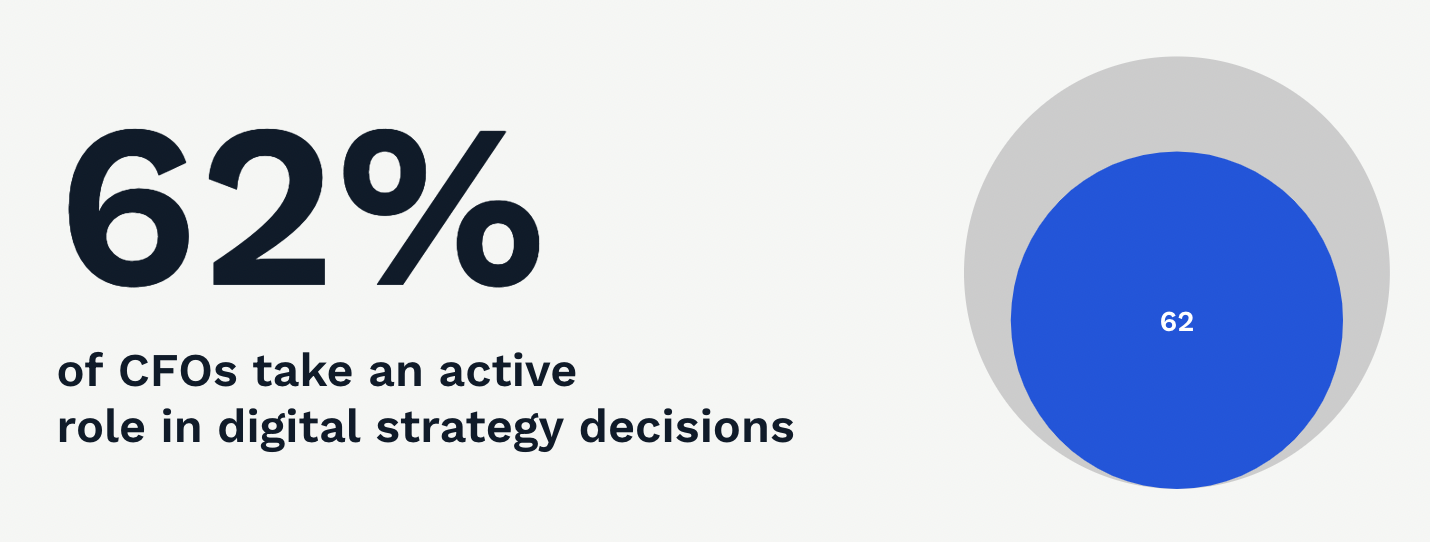The Evolving Partnership: CFOs and CTOs at the Forefront of Business Transformation
An exploration of the evolving relationship between Chief Financial Officers and Chief Technology Officers in the digital era. Traditionally, CFOs handled financial management while CTOs focused on technology. However, the rise of digital technology and artificial intelligence (AI) has blurred these roles. Now, 62% of CFOs are involved in digital strategy, recognising the value of technology in business efficiency and profitability. The synergy between CFOs and CTOs has become crucial, combining financial acumen with technological insight to ensure investments align with business strategies. This collaboration is key in managing projects, cybersecurity, and regulatory challenges. Examples like JP Morgan Chase demonstrate the successful outcomes of this integrated approach. As businesses continue to embrace digital transformation, the CFO-CTO dynamic is increasingly central to navigating the complexities of the modern business environment.

In the current business landscape, the relationship between Chief Financial Officers (CFOs) and Chief Technology Officers (CTOs) is undergoing a dramatic transformation. As organisations increasingly prioritise digital innovation, the roles of CFOs and CTOs are becoming more intertwined, shaping a new dynamic that is critical for steering businesses towards sustainable growth and competitiveness. This article explores the evolving partnership between CFOs and CTOs, particularly in the context of digital transformation, artificial intelligence (AI), and technological advancements.
The Traditional Roles: A Historical Perspective
Historically, the roles of CFOs and CTOs have been distinct and siloed. CFOs were primarily focused on financial stewardship, risk management, and reporting, while CTOs were concentrated on technological infrastructure and innovation. This traditional segregation of duties often led to a lack of synergy and understanding between the financial and technological arms of a business.
Convergence in the Digital Era

Technology and digital innovation has largely been the purview of CTOs. However, the rapid pace of technological advancements and the heightening risks and uncertainties associated with them have necessitated a paradigmatic shift. This evolution has led to CFOs forging far closer partnerships with their CTOs, a collaboration that is reshaping the trajectory of both digital and business transformation.
The integration of digital technology into the core of business operations, once overseen predominantly by CTOs, is now increasingly under the collaborative scrutiny of CFOs. This shift is underscored by our recent Digital Leaders Pitstop Survey, which reveals that 62% of CFOs are now deeply involved in shaping digital strategies. This new dynamic stems from the recognition that technology investments are pivotal not just as cost centres but as key drivers of operational efficiency, innovation, and long-term profitability.
In this era of digital convergence, CFOs are tasked with a dual mandate. On one hand, they must maintain their traditional fiscal stewardship, while on the other, they are required to understand and embrace the nuances of digital technology. Their role has expanded to include navigating the complexities of cybersecurity, data governance, and the strategic allocation of resources for technological advancements.
The necessity for CFOs to form robust partnerships with CTOs is further amplified by the volatile and rapidly evolving digital landscape. Together, they are tasked with steering their organisations through the murky waters of digital transformation. This requires a harmonious blend of financial acumen and technological expertise, ensuring that investments not only align with the company’s immediate financial goals but also propel long-term business transformation.
The convergence of the roles of CFOs and CTOs marks a significant shift in corporate strategy. It reflects a broader understanding that successful digital transformation—and indeed business transformation—requires a collaborative, interdisciplinary approach. CFOs, in partnership with CTOs, are now key architects in shaping the future trajectory of their organisations, harnessing technology as a fundamental enabler of innovation, efficiency, and sustainable growth. This evolution represents a more integrated and strategic approach to leadership in the face of the relentless pace of technological change.
The Role of AI and Technology in Business Transformation
AI and technology are key drivers in today's business transformations. One important use of AI is predictive analytics. This technology helps businesses make better decisions by predicting future trends and understanding what customers might do next. This is really useful for financial planning and strategy, which are usually managed by the CFO.
Predictive analytics gives CFOs deeper insights and more accurate forecasts, helping them make smarter decisions about where to spend money, how to save costs, identify profitable new projects, and plan investments.
AI is also changing how customers experience services and products. It allows businesses to offer personalised experiences and better customer service, which can lead to more sales and new ways to make money.
On top of this, AI helps businesses run more efficiently. It can automate routine tasks and make things like supply chains work better, which saves money and improves productivity. This helps improve a company's profits.
The CFO-CTO Synergy: A Strategic Imperative
This alliance is not merely a functional necessity but a strategic imperative, pivotal in ensuring that technology investments are financially sound and in alignment with broader business objectives. The synergy between these roles is fundamental to successfully navigating the complexities of digital transformation, a journey fraught with both opportunities and challenges.
This evolving relationship between CFOs and CTOs is characterised by a dynamic exchange of expertise. CFOs contribute their financial acumen, focusing on aspects such as cost management, return on investment (ROI), and risk mitigation. Simultaneously, CTOs bring to the table their deep insights into technology, advocating for innovative solutions that can provide a competitive edge. This blend of financial and technological expertise is vital for making balanced and strategically sound decisions regarding technology investments.
Increasingly, CFOs and CTOs are finding themselves jointly at the helm of major transformation projects. Their combined leadership ensures that these initiatives are not only technologically advanced but also financially viable and in harmony with the company's strategic ambitions. Consider the implementation of an AI-driven customer relationship management system. In such a scenario, the CTO would evaluate the technical feasibility and integration aspects of the project, while the CFO would be responsible for assessing its financial implications and potential for return on investment. This collaborative approach guarantees that every facet of the project is meticulously scrutinized and aligned with the organization's overall strategy.
Moreover, the CFO-CTO partnership plays a crucial role in navigating the myriad challenges that modern businesses face, such as cybersecurity risks and regulatory compliance. As the threat of cyber-attacks intensifies and data protection regulations become more stringent, the combined expertise of CFOs and CTOs becomes indispensable. Together, they devise robust strategies to safeguard the company's financial and digital assets, ensuring resilience in an increasingly digitalised world.
In essence, the alliance between CFOs and CTOs represents a strategic fusion of financial oversight and technological insight. It is a partnership that transcends traditional departmental boundaries, fostering a more integrated approach to decision-making and strategy formulation. This collaboration is not just beneficial but essential for businesses seeking to thrive in an era where digital transformation is not just an option, but a necessity for sustained growth and success.
Case Studies: Success Stories of CFO-CTO Collaboration
There are several notable examples of successful CFO-CTO collaborations driving business transformation. JP Morgan Chase, for instance, credits its recent growth to the strategic partnership between its CFO and CTO, which led to the successful implementation of cloud based expense management system that has saved the company billions of dollars.
Looking ahead
The partnership between CFOs and CTOs is set to become even more central to business success. As companies continue to navigate the complexities of digital transformation, the combined expertise of these roles will be crucial in harnessing the full potential of AI and technology. This evolving dynamic is not just about collaboration but about forging a new leadership model that is agile, strategic, and data-driven, ready to meet the challenges of a rapidly changing business environment.
Related Insights
View all
The CEOs Blueprint to Perpetual Transformation
In today's rapidly changing world, organisations must be constantly transforming to remain competitive. This requires a culture of change, robust risk management, and significant investment. By investing in the right capabilities and building a culture of transformation, organisations can position themselves for success in a world of constant change. In a world of perpetual disruption, incremental and iterative change is no longer enough. Organisations must embrace a culture of transformation that encourages risk-taking and learning. Robust risk management is essential to identify and mitigate potential risks. Perpetual transformation requires a significant investment of time, money, and resources.

Covelent Private Equity Mid-Market Forward Focus Report 2025
Searching for stability

Essential Sustainability Targets for Acquisition-Ready Companies
The increasing importance of environmental, social, and governance considerations in investment decisions, particularly for companies seeking acquisition.